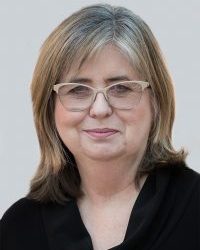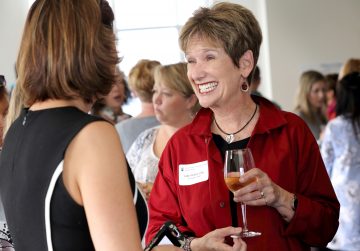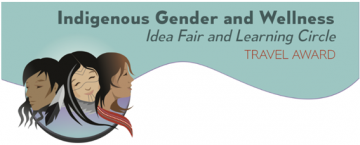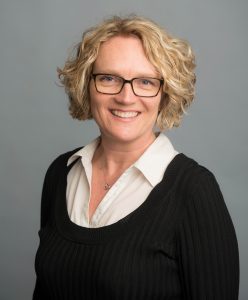
Director
Okanagan School of Education (OSE)
education.ok.ubc.ca

Okanagan School of Education (OSE)
education.ok.ubc.ca

On Tuesday July 10th, Dr. Judy Halbert and Dr. Linda Kaser, co-leaders of the Transformative Educational Leadership Program hosted a reception for UBC Faculty of Education alumni in the penthouse of Ponderosa Cedar House. With over 40 guests in attendance, the event was by all measures a great success.
During reception, guests were invited to listen to speakers from Faculty and Staff including, Dr. Jan Hare, Dr. Judy Halbert, Dr. Linda Kaser, Dr. Suzanne Scott and Michael Murphy. Though Dean Frank could not be there in person, a special video message was played to welcome guests to the event. Following the speaker’s remarks, guests were treated to drinks, hors d’oeuvres and to chat with fellow alumni.
Thank you to all of our alumni who came out and made this event such a success. Make sure to keep an eye out for future events like the Alumni and Friends Pride Reception on August 2nd the Dean Frank is hosting.
View the full set of event photos here:

Applications are now open
Gender plays an important, but often overlooked, role in wellness.
What if we paid more attention to gender in all its forms (e.g. norms, roles, identities, Two Spirit)? Could we improve wellness among Indigenous People? If you have an idea or would like to contribute, we want to hear from you!
The CIHR Institute of Gender and Health (IGH), the Institute of Indigenous Peoples’ Health (IIPH) and the Institute of Population and Public Health (IPPH), along the Kahnawake Schools Diabetes Prevention Project (KSDPP) in Kahnawake Mohawk Territory, are excited to host an Idea Fair and Learning Circle on the topic of Indigenous gender and wellness.
The Idea Fair and Learning Circle is the first phase in a larger initiative to support the development and implementation of community-led projects on the topic of Indigenous gender and wellness.
The event will provide an opportunity for Indigenous Peoples and allies to meet, share ideas and work together to turn ideas into fundable projects. Projects developed at the workshop will be eligible to apply for future funding. Overall, CIHR has set aside approximately $8M in funding over five years to support these projects (pending approval).
Funds Available:
Travel awards of up to $5,000 are available to cover the costs of attending the Idea Fair and Learning Circle, which will be held in Montréal, located on the traditional unceded territory of the Kanien;keha:ka (Mohawk) people.
Who should apply:
Research experience is not a requirement; however researchers who meet the eligibility requirements are welcome and encouraged to apply.
To be eligible, you must either self identify as Indigenous (First Nations, Inuit, Métis) or provide evidence of having meaningful and culturally-safe involvement with Indigenous Peoples (learn more about eligibility requirements on our website). We welcome applications from adults of all ages and especially encourage young adults to apply.
You may choose to apply as an Idea Contributor and come with a potential project or idea to present to others.
Or you may come as an Idea Supporter if you do not have a specific project or idea to present, but would like to contribute towards advancing Indigenous wellness with a focus on gender.
Sample project ideas:
• Improving wellness among gender- and sexually-diverse Indigenous youth
• Gender-based violence affecting Indigenous Peoples
• Digital technology to support informal caregivers: Matching the tools to the needs
• Indigenous masculine identities and wellness
• Projects with a focus on the arts (e.g. visual, music, dance, theatre, literary or media, including the contemporary practice of traditionally-based forms)
• Applying SGBA+ to a modernized framework for the regulation of self-care products
These are ideas only. Your creativity is the limit!
This award honours full-time and sessional faculty, staff and other persons associated with the Faculty of Education who have made an outstanding contribution to the Teacher Education Program at UBC.
The recipient will receive a plaque along with a Pendleton blanket. In addition, the recipient’s name will be displayed in the Faculty alongside other recipients of the award.
The nomination package should include 3 letters of nomination that address the following criteria:
Beyond the Dusky Maiden: Pasifika Women’s Experiences of Working in Higher Education
Supervisor(s): Vanessa Andreotti
Tuesday, July 17, 2018 | 4:00 pm | Room 2012, Ponderosa Commons, 6445 University Boulevard, V6T 1Z2
Beyond the Dusky Maiden records Pasifika women’s experiences of working in higher education in Aotearoa New Zealand. Using a navigational metaphor this dissertation maps the storms within higher education that are slowing down Pasifika people’s journey to success. This dissertation identifies six promising practices for enabling faster change in higher education whilst also considering the hidden conversations that are necessary to identify why institutions need to change. This dissertation recognises the neo-liberal and colonial foundations of higher education and how they contribute to a white masculine imprint that enables and enforces excess labour, non-performative diversity, infantilization, hyper-surveillance, lateral violence, and sexual assault. This dissertation records Pasifika women’s encounters with the white masculine imprint as they attempt to transform higher education institutions. Pasifika women share their methods for survival in higher education spaces in spite of patterns of exclusion.
To record Pasifika women’s journey’s this research introduces the masi methodology. The masi methodology centres Pacific/Pasifika women’s voices within the research process ensuring that they are seen as the experts on their own experiences. The Pacific research method of talanoa, a narrative enquiry developed from Pacific people’s oratory tradition is used to engage with twenty-seven Pasifika women about their experiences working in higher education. In Aotearoa New Zealand.
By admin
By:
June 29, 2018
On June 29, 2018, Her Excellency the Right Honourable Julie Payette, Governor General of Canada, announced 105 new appointments to the Order of Canada.
These appointments include our own Dr. Veronica Jane Strong-Boag. Please join us in Congratulating Dr. Strong-Boag on this great honour.
Link to the full announcement.
Story via UBC Research News.
By Edrees Kakar

ECPS Department is pleased to welcome Dr. Vicki Knight as tenure-track Assistant Professor in Special Education starting July 1st, 2018. Dr. Knight has more than 20 years of experience working with students who have autism spectrum disorder (ASD).
Please join us in welcoming Dr. Knight to our community!
By admin

Please join us in congratulating Vanessa Smith on her appointment to the Manager of Professional Learning and Administration in Professional Development & Community Engagement (PDCE).
Originally from Vancouver, Vanessa finished her BA in English Literature at UBC before leaving for McGill University in the faculty of Education. She now returns to us with a strong background in many essential university services including, Student Services, Financial Administration and Program Management.
With her most recent role as the Manager of Internships and Student Affairs Office at McGill, Vanessa oversaw the financial, personnel and business operations. This will be a great asset to PDCE in her new role. As the new Manager of Professional Learning and Administration, Vanessa works closely with the Assistant Dean of PDCE and is responsible for the development and implementation and Administration for PDCE’s Domestic cost-recovery programs. She will also be direction all administrative functions for the unit.
We would also like to say thank you to Maggie Zustovic who provided exemplary service while she filled in temporarily as the Administrative Manager over the past two months.
“hiił kʷiiʔił siƛ (Bringing Something Good from Way Back): A Journey to Humanize Post-Secondary Education”
Supervisor(s): Prof. Shauna Butterwick, Supervisor (Educational Studies); Prof. Deirdre Kelly (Educational Studies); Prof. Robina Thomas (University of Victoria, Social Work)
Friday, July 13, 2018 | 1PM | Room 108, North Island College, 3699 Roger St, Port Alberni, BC
This dissertation explores my personal journey of becoming a human being, particularly by drawing on Nuu-chah-nulth principles of ʔuuʔuuqʷaač̓ii (self-independence). Relevant literature, resources and personal stories help identify the underpinning aspects of epistemological dominance, blindness and collisions, which occur in the classrooms of post-secondary institutions. Although Indigenous-led education and policy contributes to Indigenous student success, more has to be done to understand current processes of Indigenization, decolonization and reconciliation. Educational practitioners, Indigenous and non-Indigenous, who engage help lead the way, but will likely encounter the unsettling nature that arises.
At times, feelings of fear, shame and guilt arise leaving people feeling unsure or unwilling to try. Nuu-chah-nulth teachings of yaʔakmis (love and pain) represents the possibilities and limitations of integrating Indigenous ways of knowing and being within post-secondary. Indigenization, reconciliation and decolonization are all processes that require courage and action; they also require leaders who are ready. They also require an understanding of one’s self in relation to values, belief and prejudices; it is a critical component of these processes. Leaders must be genuine while recognizing the value of Indigenization, decolonization and reconciliation.
The research questions are designed to bring a holistic approach and provide guidance that will help to improve my practice, as an educator. The research questions are,
• What do the principles of Indigenous self-determination mean in the context of indigenizing initiatives within post-secondary education?
• What are the possibilities and limitations (the love and pain)?
• What needs to change in order for these principles to be realized in these initiatives?
Throughout this journey my personal life experiences, as Nuu-chah-nulth-aht (person of Nuu-chah-nulth ancestry), inform and help me unmask favorable and unfavorable practices, specifically of Indigenization. The findings reveal the uncomfortable nature many feel when confronted with the history of Canada and the daunting task of Indigenization, decolonization and reconciliation. Unpacking colonial policies and practices of education while examining more closely aspects of who we are (values, beliefs and prejudices), particularly as people who share this land, is a critical component of doing the work of Indigenization, decolonization and reconciliation.
 The Department of Language & Literacy Education warmly welcomes Dr. Meike Wernicke to the position of Tenure-Track Assistant Professor in French Education and French Teacher Education. Dr. Meike brings impressive research, publishing and teaching experience; interests that extend the scope and nature of LLED possibilities; and a strong commitment to goals of equity, diversity, inclusiveness and social justice in education.
The Department of Language & Literacy Education warmly welcomes Dr. Meike Wernicke to the position of Tenure-Track Assistant Professor in French Education and French Teacher Education. Dr. Meike brings impressive research, publishing and teaching experience; interests that extend the scope and nature of LLED possibilities; and a strong commitment to goals of equity, diversity, inclusiveness and social justice in education.
Please join us in welcoming Dr. Wernicke to our community!